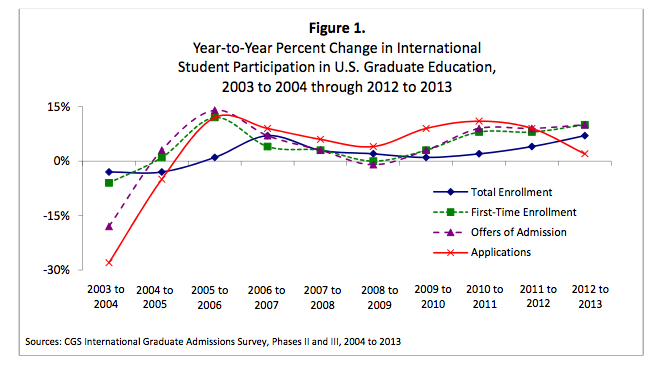A 40% boom in first-time enrolments from Indian students at US graduate schools has offset a slow down of growth from Chinese students to 5% contributing to an overall 10% increase in first-time enrolments for 2012-2013.
News and business analysis for Professionals in International Education
Have some pie!
US graduate enrolments up: India explodes, China deflates

The latest figures from the Council for Graduate Schools (CGS) show a radical shift in top source markets for graduate students after seven consecutive years of double digit growth in Chinese enrolments and meagre 1% and 2% increases in Indian students in 2012 and 2011.
First time enrolments more than overall international student enrolments are considered the best indicator of future trends in the sector because they capture students at the beginning of their graduate career and can project where they will be over the next few years.
Despite the downturn, China continues to be the largest source of international graduate students
Researchers from the Council say that there is no explanation for the slow down in growth among Chinese students but that it could denote a trend.
“What we do know is that this finding is very consistent with CGS’ Phase II survey report, released in August of this year,” said the Jeff Allum, Director, Research and Policy Analysis at CGS. “This does not appear to be a fluke.”
Despite the downturn, China continues to be the largest source of international graduate students, representing 34% of all international graduate students in the US.
Enrolments from the country’s other top source market, South Korea, fell 12%, down for the sixth consecutive year.
CGS President Debra W. Stewart said the dramatic changes in enrolment demographics shows the need for variety in source markets.
“While the substantial increase in first-time enrolments of Indian students is positive, the fluctuation in India enrolment in recent years makes it difficult to confirm a definite trend, ” she said.
“Taken with slowed growth in first-time enrolments from China, and the persistent declines in first-time enrolments of South Korean students, I don’t think we can count on any single country to sustain the strong participation of international students that US graduate schools have enjoyed in the past.”
Brazil seconded India’s in enrolment surge, increasing 17%, up from 14% gains in 2012.
STEM fields continue to have the largest pull among foreign graduate students. Physical and earth sciences – including mathematics, computer science and engineering- together comprised 47% of international student enrolments this year.
“I don’t think we can count on any single country to sustain the strong participation of international students that US graduate schools have enjoyed in the past”
The gains in enrolment seem to have calmed concerns that arose earlier this year due to figures from the second phase of the study showing international student applications had fallen to just 2% of over all applications on the back of 9% and 11% growth the two previous years, respectively.
“There is no doubt that international students are eager to take advantage of the extraordinary quality of US graduate institutions,” said Stewart.
“The continued growth in first-time enrolment is a sign that decreasing applications have not yet damaged the strong pipeline of international graduate students.”
Sent to CGS’s 513 US college and university members during September and October, the study received a 56% (285 institutions) response rate and represents 66% of the approximately 103,000 graduate degrees awarded to international students in 2010-2011.
Still looking? Find by category:



I am curious if there has been a decline in financial support for international graduate students during this same period.